Accelerate Scar Recovery – Therapeutic Treatments Designed to Support Tissue Regeneration and Minimize Lasting Skin Damage
At Active Motion Injury Clinic, we understand that healing from surgery or injury involves more than just physical recovery – it’s about feeling like yourself again.
Whether your scar is fresh or has been with you for years, we offer the expertise and treatments to improve its appearance, comfort and function. Scar healing is a unique journey, but with the right approach, you can regain your confidence once again.
Why Scar Healing Matters
Scars are an inevitable part of the healing process, especially after surgery or injury. While they may appear to be just a cosmetic concern, scars can affect more than your skin. They can impact your physical comfort, flexibility and self-esteem. Some scars, particularly surgical ones, can continue to evolve over time, causing discomfort or restricting movement long after the initial healing.
The good news is that with the right care, you can dramatically improve the appearance and functionality of your scars, helping you return to your activities without the discomfort.
How Does Red Light Therapy Work?
Not all scars are created equal, and understanding the type of scar you have is the first step in improving its appearance and function. Here are the most common types:
- Hypertrophic Scars: These scars are raised and red but stay within the boundaries of the original incision. They often feel itchy or sensitive in the early stages but may flatten over time with the right treatment.
- Keloid Scars: Keloids extend beyond the original wound site, often growing larger than hypertrophic scars. They can be more common in individuals with darker skin and may require intervention to reduce size and discomfort.
- Atrophic Scars: These are sunken scars, often caused by collagen loss during healing, and can feel uneven or pitted.
- Contracture Scars: Often resulting from burns or extensive surgery, these scars tighten the skin, potentially restricting movement, especially around joints.
Request A Call Back from a Therapist
If you’re not quite ready to book an appointment yet and have some questions you would like answered first, click the link below to complete a form to get the conversation started.
Effective Strategies for Scar Healing
While scars are permanent, the right treatment can improve their appearance, texture, and function. Here are five effective strategies to support your healing journey:
- Maintain Proper Hydration
Hydration is key to supporting healthy scar tissue. Well-hydrated skin is more flexible, reducing the likelihood of raised or stiff scars. Apply a quality moisturizer like Alhydran, infused with Aloe Vera, to keep your scar soft and smooth. - Use Silicone Gel Sheets and Creams
Silicone is widely recommended for treating scars because it helps reduce size, redness, and hardness. Silicone gel sheets create a barrier that locks in moisture, preventing excess collagen buildup, which leads to raised scars. For smaller or hard-to-reach areas, silicone gel creams can help reduce redness and thickness. - Protect Your Scar from Sun Exposure
Sun exposure can darken scars and make them more noticeable, especially in the first year after surgery. Always apply a broad-spectrum sunscreen (SPF 30 or higher) or wear protective clothing when exposed to sunlight to prevent pigmentation changes. - Massage Your Scar
Scar massage is a powerful technique to improve texture and flexibility. By applying a moisturizing lotion, use gentle circular motions to break down excess collagen, increase blood flow and promote healing. Massaging your scar for 5–10 minutes, 2-3 times a day, can flatten raised scars and improve tissue flexibility. - Seek Professional Help with Scar Therapy
At Active Motion Injury Clinic, we offer specialised scar therapy to help you heal more effectively. Our scar therapists use hands-on techniques to soften tissue, break down adhesions and improve mobility. We also provide education on home care, including massage techniques, hydration tips and gentle stretches to maintain progress between sessions.
How Can We Help You Heal?
Red Light Therapy is safe, non-invasive and suitable for people of all ages. Whether you’re recovering from an injury, managing chronic pain, or looking for a way to boost your overall wellness, RLT can help. It’s a simple and effective way to support your body’s natural healing processes.
At Active Motion Injury Clinic, we offer Red Light Therapy as part of a comprehensive treatment plan tailored to your needs. If you’re curious about how Red Light Therapy can benefit you, reach out to our team for more information or to schedule a consultation.
Let us help you feel your best – whether you’re recovering from an injury or just looking to improve your overall health.
